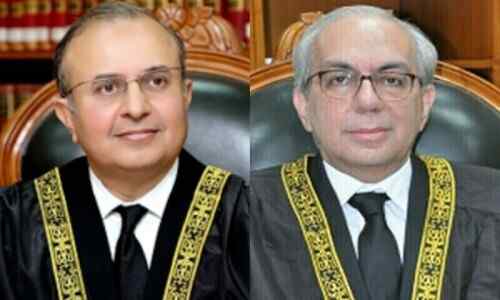ISLAMABAD — The controversy surrounding the 26th Constitutional Amendment has resurfaced after the Supreme Court uploaded notes from Chief Justice of Pakistan (CJP) Yahya Afridi on its official website, triggering a sharp rebuttal from two senior judges.
On Wednesday, Justices Syed Mansoor Ali Shah and Munib Akhtar issued a joint letter rejecting the CJP’s reasoning for not convening a full court last year to hear challenges to the amendment. The letter, now also in the public domain, underscores a widening divide within the apex court over how to handle one of the most consequential constitutional cases in recent memory.
The Missed Full Court Session
At the heart of the dispute is the October 31, 2024, meeting of a three-judge committee formed under the Supreme Court (Practice and Procedure) Act, 2023. The majority of that committee — Justices Shah and Akhtar — had directed that all judges of the Supreme Court should sit as a full bench to hear petitions against the 26th Amendment.
But CJP Afridi declined to follow through. In notes now uploaded on the SC’s website, he argued that calling a full court could risk damaging “collegiality among judges” and unnecessarily subject the judiciary to public scrutiny.
The two senior judges say that explanation does not hold water. In their letter, they stressed that only a full court could have ensured a legitimate and binding outcome on such fundamental constitutional questions. By bypassing that process, they wrote, the opportunity for institutional consensus was “lost, perhaps irretrievably.”
Judges Push Back
According to Justices Shah and Akhtar, their repeated requests for a full court — whether through judicial proceedings or an administrative meeting — were ignored. Instead, the CJP engaged in informal consultations with other judges, a practice they argue cannot replace the authority of a formally convened bench.
“What was required was collective deliberation and decision-making,” their letter stated, warning that the lack of such a process continues to reverberate through the judiciary and the broader constitutional framework.
The judges also reminded the CJP that the Oct 31 committee’s decision was legally binding. Its directive to hear the case on Nov 4, 2024, was never implemented, despite their follow-up letter at the time.
Concerns Over Transparency
The release of the CJP’s notes — despite earlier instructions against making the committee’s records public — has added another layer of friction. The two judges now insist their response letter be published on the Supreme Court’s website alongside the CJP’s notes. If not, they warned, they would make the letter public “through other appropriate means.”
They further pointed out that the Judicial Commission of Pakistan (JCP) was wrongly used to air parts of the CJP’s position, since the JCP had no authority to revisit or override the Oct 31 committee decision.
Why This Matters
The dispute goes beyond internal court procedure. At stake is the judiciary’s ability to present a united front on constitutional amendments — matters that directly shape Pakistan’s democratic structure. By failing to convene a full court, critics argue, the Supreme Court risks undermining the legitimacy of any eventual ruling on the 26th Amendment.
With both sides now making their positions public, the confrontation has shifted from private deliberations to a battle of record-keeping — one that may leave “History,” as the judges themselves put it, to deliver the final verdict.
